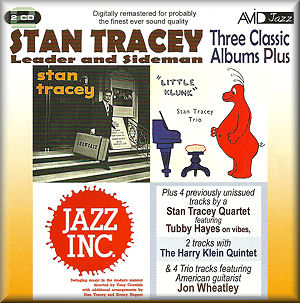CD1
Stan Tracey Showcase
1. Almost Like Being In Love
2. Over The Rainbow
3. The Surrey With The Fringe On Top
4. I Love Paris
5. The Best Thing For You
6. I Can't Give You Anything But Love
7. This Nearly Was Mine
8. They Can't Take That Away From Me
9. I've Got Five Dollars
10. Mad About The Boy
11. But Not For Me
12. Love Is
Little Klunk
13. Li'l Ol' Pottsville
14. Dream Of Many Colours
15. Little Klunk
16. Boo-Bah
17. Baby Blue
18. A Walk In The Park
19. We'll Call You
20. Free
The Harry Klein Quintet
21. Euphony
22. Monument
CD2
Jazz Inc.
1. Caravan
2. Boo-Bah
3. Lullaby
4. Reelin'
5. Li'l Ol' Pottsville
6. Jamba
7. I Let A Song Go Out Of My Heart
8. Summertime
Stan Tracey Quartet
9. We'll Call You
10 The Toff
11. Festival Junction
12. Rapandas
Jon Wheatley/Stan Tracey/Andy Cleyndert
13. Lover
14. Whisper Not
15. If I Should Lose You
16. Ruby, My Dear
Collective Personnel
Stan Tracey - Piano, vibes
Leon Calvert, Les Condon - Trumpet
Al Newman - Alto sax. clarinet
Vic Ash - Clarinet
Bobby Wellins - Tenor sax
Harry Klein - Baritone sax
Tubby Hayes - Vibes
Ray Dempsey, Jon Wheatley - Guitar
Kenny Napper, Johnny Hawksworth, Sammy Stokes, Andy Cleyndert - Bass
Phil Seamen, Ronnie Verrell, Tony Crombie, Eddie Taylor - Drums
Recorded between 1955 and 2003, most of these tracks present Stan
Tracey early in his career. The earliest recordings are Euphony
and Monument, taped in 1955 by the Harry Klein Quintet. This
teams the high-flying clarin et of Vic Ash with the low tones of Harry
Klein's baritone sax. Stan Tracey plays a couple of short solos but
his style is undistinguished, although he comps securely as a member
of the rhythm section.
The next tracks date from 1958 and are the first twelve on the first
CD, taken from the LP Stan Tracey Showcase. These show Stan
as an exponent of the vibraphone as well as the piano. His style on
vibes is similar to the straightforward methods of Milt Jackson. His
piano style at this stage was an amalgam of influences - the approach
of a young man still in search of a distinctive style. Perhaps he
was showing his obstinacy in the way he abruptly ends The Best
Thing For You. This track has echoes of Thelonious Monk, who
was to be one of the main influences on Tracey, and I've Got Five
Dollars uses Monkish dual notes. Yet on most tracks he sounds
like an assured player who is still seeking his own voice. Note that
all the tunes on this LP were written by other people - mostly jazz
standards.
However, the next LP - Little Klunk (from May 1959) - was
entirely composed by Stan, revealing his talent as a composer. The
music is more decisively Monkish and Li'l Ol' Pottsville
might be a Thelonious Monk tune. It's as if Tracey had heard Thelonious
and decided "That's the route I want to take".
In chronological order, the next four tracks (tracks 9 to 12 on
CD2) come from a December 1959 broadcast by Tracey with Tubby Hayes
playing the vibes. The Monk influence is already in full flower, with
jagged chords and percussive notes from Stan. But Festival Junction
reminds us of another influence on Tracey. It is a Duke Ellington
composition - a typical Ducal blues - and Stan learnt a lot from the
Duke's unconventional piano methods.
Recorded soon after - in January 1960 - Jazz Inc. features
the band of drummer Tony Crombie. The LP mixed jazz standards with
originals by Tracey, Crombie and bassist Kenny Napper. Stan's Li'l
Ol' Pottsville makes a reappearance in a rather brash arrangement.
I'm afraid this is a characteristic of several tracks here, which
seem to match the extrovert style of Tony Crombie, who sometimes went
a bit over the top. Caravan is rather fierce, with a disjointed
tenor solo from Bobby Wellins. The Monk influence on Tracey is evident
in his own Boo-Bah (which was also on the Little Klunk
album).
The last four tracks in this collection take us forward several
decades to 2003, when Stan joined guitarist Jon Wheatley and bassist
Andy Cleyndert in four jazz standards which illustrate Tracey's mature
style, which might be said to have gained from exposure to both Thelonious
Monk and Duke Ellington. The guitarist gets most of the solo space,
and only Monk's Ruby, My Dear allows us to hear much of Stan.
Tony Augarde
www.augardebooks.co.uk
